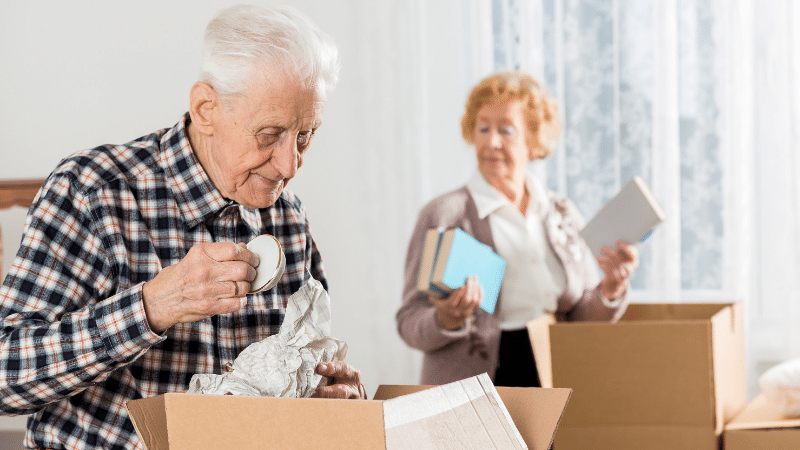
Americans on an average own over 300,000 items in their homes, and 1 out of 10 Americans rent storage units for their extra belongings. Seniors collect items over the course of their life and may come into a situation where they need to downsize to a smaller home or apartment or move into a nursing home and get rid of some belongings. This is usually not an easy process for most, so it is always best to be prepared to help your senior loved one declutter.
Tips on How Seniors Can Declutter Their Home
Despite what some might think, a person’s home doesn’t have to be filled with knick-knacks, keepsakes and odds and ends that never get used. In fact, such clutter could pose a safety hazard to seniors who might not be able to easily move around the house anymore. Here are some tips to help your loved ones clear out some of the stuff they have accumulated:
Start with one room
You should never try to declutter multiple rooms at once. The process of downsizing and decluttering is stressful for most, so it is important to start with one room and slowly move to others. The focus should be on the items that are least needed.
Declutter flat surfaces
Make sure to declutter flat surfaces first. This is the easiest and quickest way to get a head start on cleaning your senior loved one’s home. Find spots for each item to make it easier to pick up every day. For example, find a good spot for the remote and glasses so they can be easily found.
Declutter nicknacks and décor
Get rid of unnecessary décor and knickknacks from shelves so they can take care of their home faster and easier. They can let go of these items and pass them on to someone else.
Give your kids back their memories
If your senior loved one has some old items from their children such as old report cards, drawings, or toys, it is a great idea to give it back to them so they can enjoy them and eventually pass them on to their children.
Get rid of large furniture
Make sure that the senior gets rid of large furniture that can fall on them and cause injury. This is especially important for shelves and any other furniture items that can fall.
Keep, Throw out, Donate
It is best to make keep, throw out, and donate piles where you can assess what is needed and what is not needed. Once the piles are made, your loved one can go through them again to check if they accidentally placed something in a wrong pile. If there are items that do not fit any of these files, the senior can create a “maybe” pile which they can revisit later. This should remove some of the pressure of deciding right away.
Declutter hazardous items
It is important to declutter and remove hazardous items from your senior loved one’s home to help keep them safe from falls and other injuries. Here is a list of examples of items that should be removed from their home to keep it safe:
- Rugs that are old
- Broken chairs and couches
- Equipment and power tools
- Expired food
- Old medicine
- Decorations that are not being used
This is not a comprehensive list of items that you may need to remove from your loved one’s home. Each home is unique and may contain other items that may be harmful to their mobility and safety in the home.

Items for a 90-day test
If your loved one is not sure if they want to get rid of an item because of an emotional connection or because they may eventually need it, you can create a pile of these items and put them in a box for 90 days and see if they will need them in the next 90 days. If they end up not using them after 90 days, that is a sign that they don’t need it and can get rid of it.
Remove any duplicates of items
Many homes have items that are duplicates because people may have thought that they don’t have an item, purchase it, and then figured out that they have it. If your loved one has such an item and they have a “preferred” item that they generally use, they should get rid of the item they don’t use.
Here are some duplicate items that your loved one may have around their home:
- Mugs, knives, spoons, plates
- Stationery, pencils, notebooks, pens
- Shoes, bags, shirts, purses
- Towels, soaps, washcloth
- Sunscreen, soaps, sewing kits
Everything should have its own spot in the home
After decluttering their home, seniors should decide where all items should go. This is the best way to stay organized. Every item should have its own space; therefore, it is easy to put items back where they belong. This way, they avoid having piles of stuff around the home.
Don’t multitask when cleaning
You should always help your senior take time to clean the different rooms in their home. Avoid distractions such as a TV or phone when you are decluttering. Set aside a specific amount of time, such as an hour of uninterrupted time to tackle a space or a room.
Use storage wisely
Make sure to organize wisely with the space you have. Always, use helpful items when it comes to organization to make sure the space appears neat and organized. Here are some tips:
- Bins and baskets: You can use bins and baskets of various sizes to organize items and avoid extra clutter being piled up on horizontal spaces.
- Have a space for items that are coming in: There should be a specific space to put items that can be sorted right away or later. This includes mail and any other items that may be coming into the home regularly and need to be organized.
- Organizing closets: Make sure to work with your senior to remove any shoes, clothing, bags, and decorations that they do not use so they can easily get to the items they use daily.
- Get help from other family members: If your senior loved one has a lot of stuff to declutter, it may be a great idea to enlist help from other family members and friends. Working in a group is more fun and the decluttering process will take less time. This also gives your loved one an opportunity to spend some time with extended family and friends while working on a task that will better their life.
The idea of having your senior loved one organize and declutter their home is to make it easier for them to find items and be safe in their home. Each person is different, so make sure that your loved one agrees to and is comfortable with decluttering before starting this process. After all, the home is theirs and they should declutter at their own pace and comfort level.
Do you or a loved one need senior home care? Assisting Hands of Park Ridge, IL can help. Our highly skilled caregivers will provide personalized care to your loved one so you can have peace of mind and know they are in good hands. If you need help with elder care for your loved one, call Assisting Hands at (847) 796-6685.




